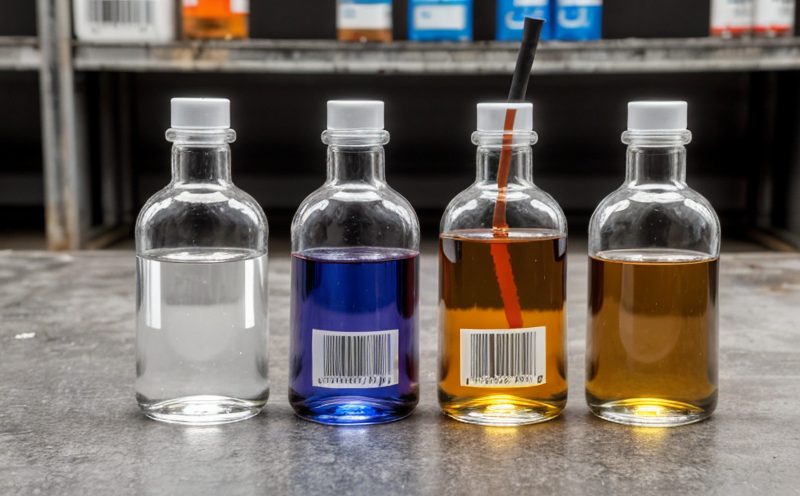ISO 175 Stability and Degradation Testing of Plastics in Liquids
The ISO 175 standard is a critical tool used to evaluate the chemical stability and degradation behavior of plastics when exposed to liquids. This method, widely recognized for its accuracy and reliability, allows stakeholders across various industries to ensure that their plastic materials meet stringent quality and safety standards.
Plastics are essential components in numerous products ranging from consumer goods to industrial equipment. However, prolonged exposure to certain chemicals can lead to degradation, affecting the integrity of these materials over time. ISO 175 provides a standardized procedure for assessing how plastics behave under specific liquid conditions, which is crucial for product longevity and performance.
This testing involves immersing plastic samples in defined liquids at specified temperatures and durations. The process simulates real-world conditions that may accelerate the aging of materials due to environmental factors like moisture or chemical contaminants. By conducting this test according to ISO 175 guidelines, manufacturers can identify potential issues early on in the development stage, ensuring they have robust solutions ready for market.
The core objective of ISO 175 is not just to observe changes but also to quantify them accurately using precise instruments and methods specified within the standard. This quantitative data helps quality managers make informed decisions about material selection and formulation adjustments needed to enhance product reliability.
For R&D engineers, this service offers a comprehensive understanding of how different variables—such as temperature, liquid type, and duration—affect plastic properties. Armed with such insights, they can optimize formulations for better resistance against chemical attack while maintaining desired mechanical attributes like strength or flexibility.
Compliance officers benefit greatly from ISO 175 because it provides them with a robust framework to demonstrate adherence to international standards relevant to their industry sectors. This compliance ensures trustworthiness among customers and regulatory bodies alike, thereby enhancing brand reputation.
When procurement teams are involved in selecting suppliers or sourcing raw materials, knowing the results of ISO 175 tests can significantly influence their choices. They can prioritize vendors who supply high-quality plastics proven capable of enduring harsh chemical environments without compromising safety standards.
Benefits
Conducting ISO 175 Stability and Degradation Testing offers numerous advantages, particularly for companies operating in sectors where plastic parts come into contact with liquids during use. Here’s why this testing is beneficial:
- Promotes Product Integrity: Ensures that your products remain intact even after extended exposure to chemicals.
- Informs Formulations: Provides valuable information on which additives or modifications are necessary for improved resistance.
- Enhances Reputation: Demonstrates commitment to quality and safety, building customer confidence.
- Facilitates Compliance: Helps meet international standards, reducing the risk of non-compliance penalties.
- Saves Costs: By identifying problems early in development stages, it minimizes costly rework or product recalls later on.
- Supports Innovation: Encourages continuous improvement by providing detailed feedback about material performance.
The comprehensive nature of ISO 175 ensures that all relevant aspects are considered during the evaluation process. This holistic approach guarantees that every detail contributing to plastic degradation is captured, making it an indispensable tool for any organization dealing with liquid-exposed plastics.
Industry Applications
The ISO 175 Stability and Degradation Testing finds significant application across multiple industries where the use of plastics in contact with liquids is prevalent. Some key sectors include:
- Beverage Packaging Industry: Ensures that containers like bottles or cans do not leach harmful compounds into beverages.
- Pharmaceutical Manufacturing: Validates drug delivery systems and packaging materials for compatibility with medicinal products.
- Automotive Sector: Tests components such as fuel lines, hoses, and other parts that are frequently exposed to various fluids during vehicle operation.
- Agricultural Machinery: Evaluates equipment used in handling chemicals or fertilizers which could impact plastic durability.
In each case, ensuring that plastics maintain their integrity under liquid exposure is paramount. Failure to do so can lead to contamination risks, reduced lifespan of products, and potential health hazards. Therefore, ISO 175 serves as a vital tool for safeguarding both consumer safety and operational efficiency in these critical areas.
Competitive Advantage and Market Impact
Implementing ISO 175 Stability and Degradation Testing offers significant competitive advantages that can positively influence market positioning. Here’s how:
- Innovation Leadership: By staying ahead of regulatory requirements, you position yourself as a leader in innovation within your industry.
- Customer Trust: Demonstrating adherence to international standards builds trust among consumers and stakeholders alike.
- Premium Brand Perception: Products known for their superior quality tend to command higher prices and greater demand.
- Risk Mitigation: Early detection of potential issues allows proactive measures, reducing the likelihood of costly mistakes downstream.
- Strategic Partnerships: Companies recognized for high standards often attract better partnerships leading to expanded market reach.
The detailed insights provided by ISO 175 testing enable informed decision-making throughout product lifecycle management. From initial design phases through production and distribution, these data points contribute significantly towards creating robust products that meet or exceed customer expectations.





